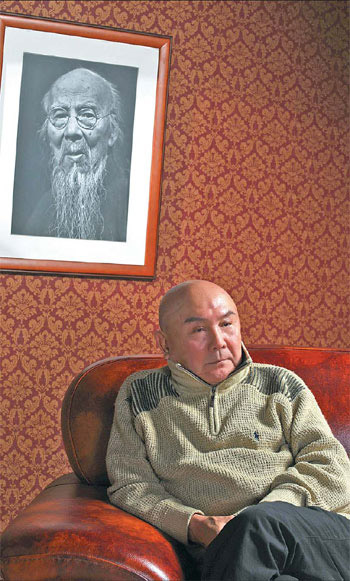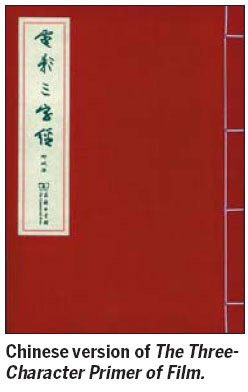 |
|
Liu says he has exerted all his efforts to write The Three-Character Primer of Film. Provided to China Daily |

Moviemaker Liu Cheng's 900-character book about his craft has earned him a place among the elite of cinema theorists. Mei Jia reports in Beijing.
Filmmaker Liu Cheng's 900-character book about filmmaking theory recently became the first from a mainlander to make the Margaret Herrick Library of the American Academy of Motion Picture Arts and Sciences. The Three-Character Primer of Film is the 72-year-old's distillation of his 50 years of moviemaking experience, presented in the Three-Character Classic (San Zi Jing) format of an ancient schoolkids' educational chant about Confucian ideals.
The content covers a wide range of cinematic arts and sciences. They include general theories, scriptwriting, acting, directing, cutting and technology.
"We're certain that it will be of great benefit to the many filmmakers and scholars who use the library," library director Linda Harris Mehr says.
The academy's president emeritus Sid Ganis invited Liu to the 84th Oscar awards ceremony in late February. He afterward brought Liu to a ceremony at the Margaret Herrick Library, where Liu donated his book's Chinese and English versions.
Liu says a book launch and promotion seminar will be held in Hollywood.
"I randomly wrote the first two lines in San Zi Jing style," he says.
"Then, at others' encouragement, I extended it to 900 characters."
Those first two lines were written when he was thinking about a friend's failed film investment on a plane.
He wrote:
"To speak of film in terms of fame,
Fails its true essence to proclaim."
When Liu mailed the drafts to Hollywood for feedback, the directors, playwrights, and actors and actresses - most of whom didn't know Liu - were amazed a theorist could condense such complicated concepts into two pages of poetry.
David Seidler, who wrote The King's Speech, says: "This deceptively simple little book contains far too much of what you need to know. This begins with its format. By setting such stringent restraints for the use of characters and words, Liu Cheng immediately teaches a valuable lesson about working within limitations."
Mike Medavoy, the Oscar-winning Black Swan producer who was born in Shanghai, says: "I have spent over 40 years producing more than 300 films to realize what Mr Liu Cheng has explained in 900 words."
Medavoy is also happy to learn from Liu's book that "there is no boundary between moviemakers of the East and West".
He believes there's more room for "cooperation between China and Hollywood to make great movies as advocated by Mr Liu Cheng in his book".
Ganis recalls staying in his car after arriving home after midnight to finish the book. He became so engrossed he didn't notice the cold. He calls the book a "classical truth".
Ganis told Liu, when he met him at the awards ceremony, that he appreciates the traditional Chinese wisdom Liu included in the book and that he believes the book bridges China and the outside world.
Liu believes Australia-based American writer and translator Linda Jaivin, who started learning Chinese in 1976, has given his lines a magic touch.
Jaivin initially expressed reluctance to translate the 900-character verse and said it couldn't be translated into English. Liu suggested using Shakespearean sonnets, and Jaivin was inspired, Liu recalls.
"Liu wanted to have the English retain the flavor of the Chinese original," Jaivin says in an e-mail to China Daily.
"This was an interesting challenge. I aimed to make each line as brief as possible and yet still read like a poem. The result in this case is not sonnets, by the way - these have a very specific structure - but the lines do rhyme."
She says the translation isn't just of language but also of cultural and historical allusions.
"It's a bit like translating subtitles for films - something I've done quite a lot," she says.
"These, too, need to be brief yet instantly understandable."
Liu has revised the 900 Chinese characters more than 100 times since the book's 2007 publication.
A bilingual hardcover copy was published in 2011. It contains two volumes - one printed with calligraphy on rice paper and bound in traditional style, and another with the original poem and explanations in English. The second volume contains more than 50 commentaries selected from 100 pieces by world-renowned film professionals from several countries, including Chen Kaige and Zhang Yimou.
The book will soon be published in 49 languages - an effort that has won the United Nations' recognition.
"I've led a loser's life throughout my career," Liu says.
"So, I want to exert all my efforts in this single endeavor. I've never worked so hard on anything."
Liu has witnessed Chinese cinema's development for more than 50 years. He has worked as an actor, a screenwriter, a director, a producer, a senior State Administration of Radio, Film and Television official and a film academy instructor.
Liu is currently art director of China Central Television's Movie Channel.
"While I've never succeeded in any of the areas I worked in, I've seen so much success and failure," he says.
"And I have things I feel I ought to say."
He hopes his work fills an empty space among world-class Chinese film theory books.
The San Zi Jing style makes it accessible to newbies yet useful for masters, he says.
Chen, the director, says the book is about "the topic of art and the topic of life itself".
|
|
|
|
|
|
|
|
